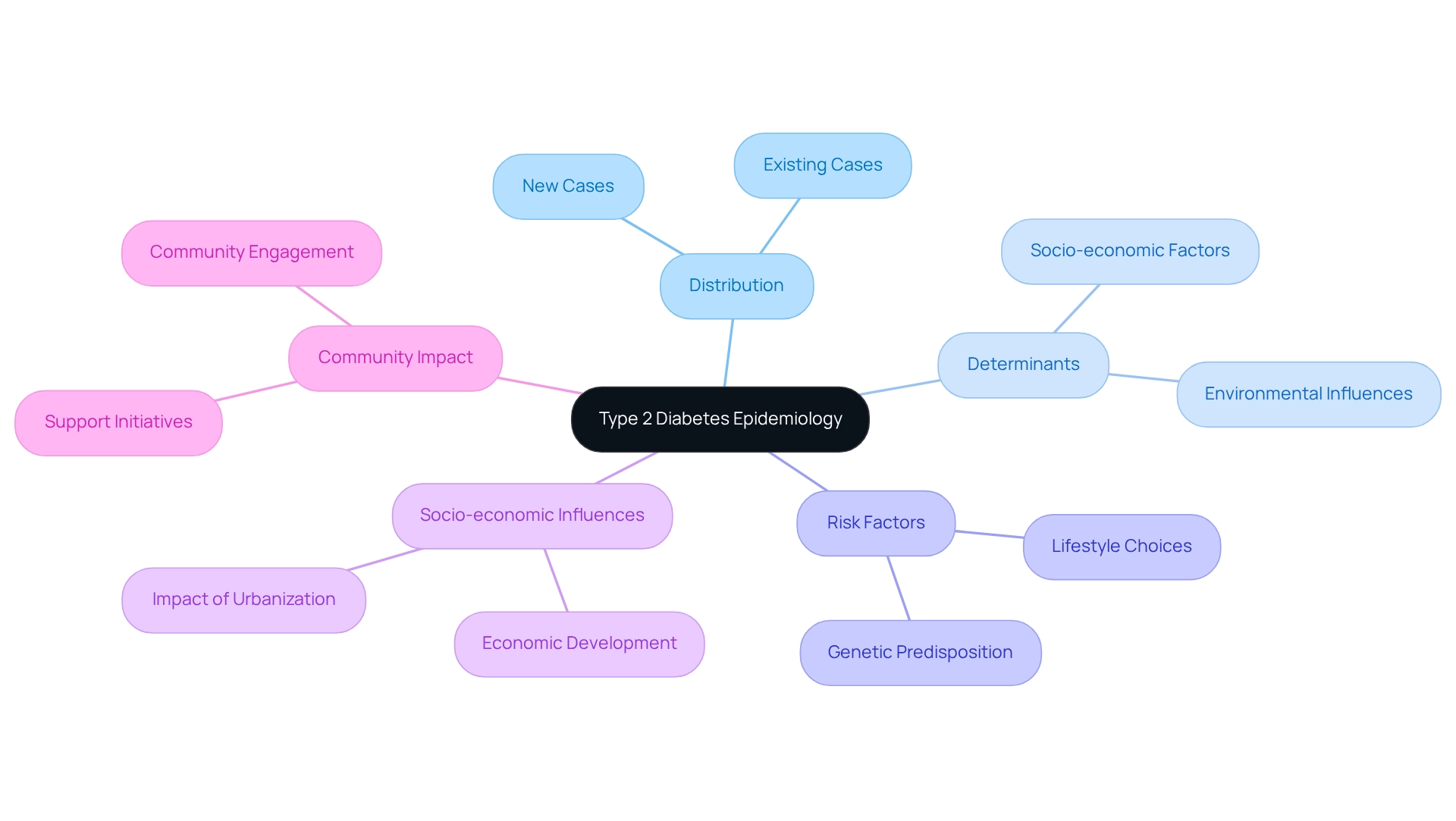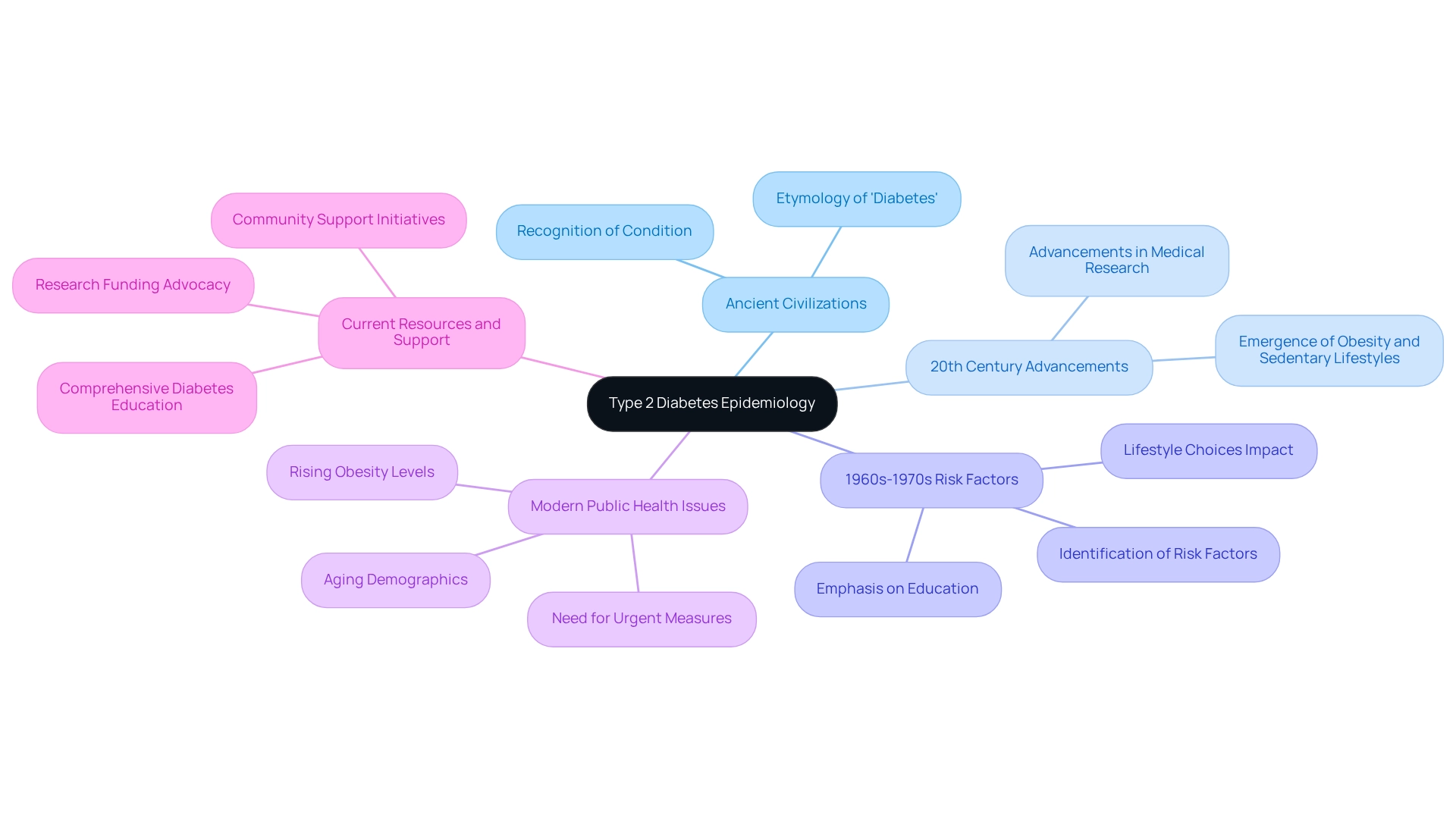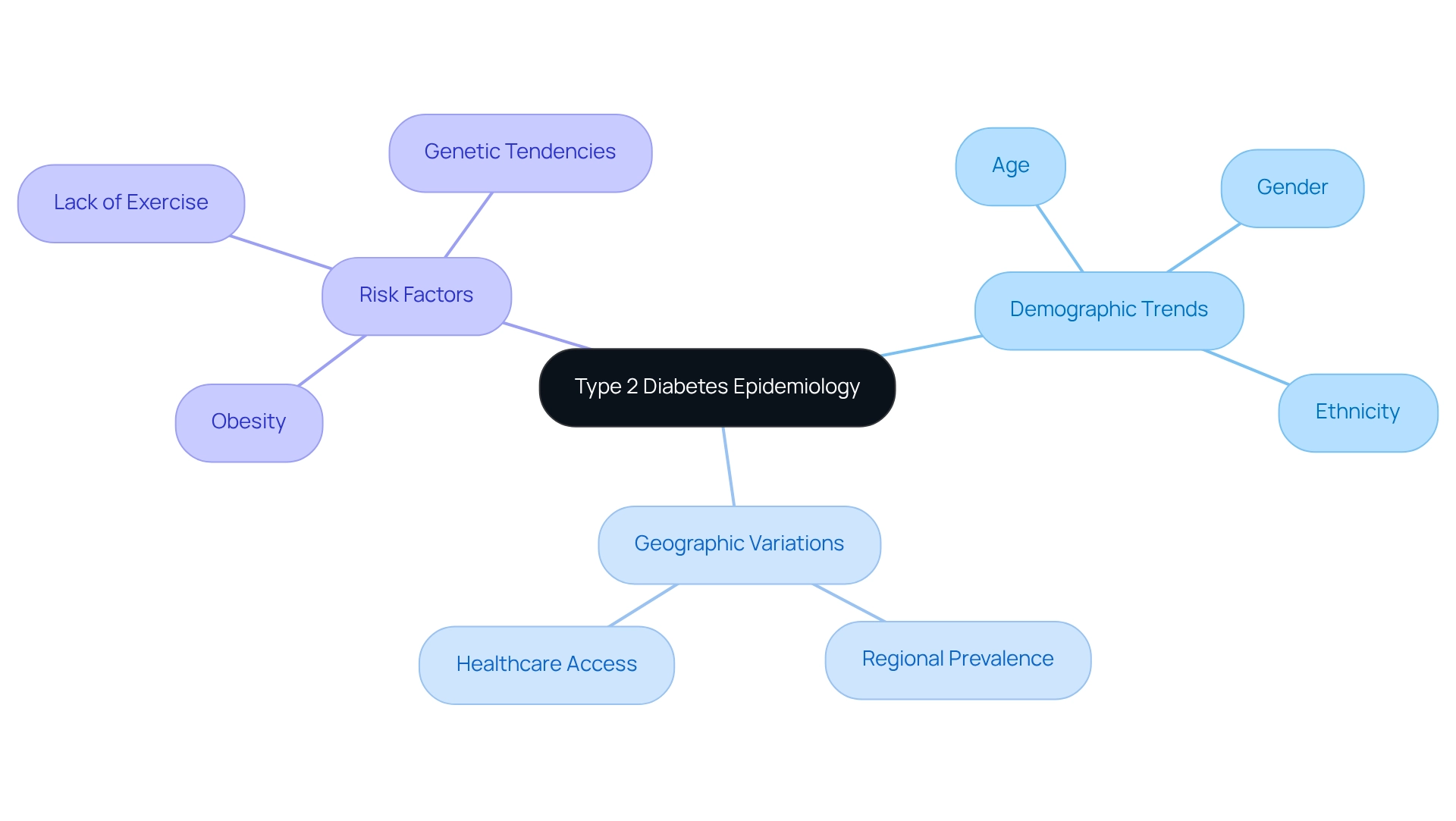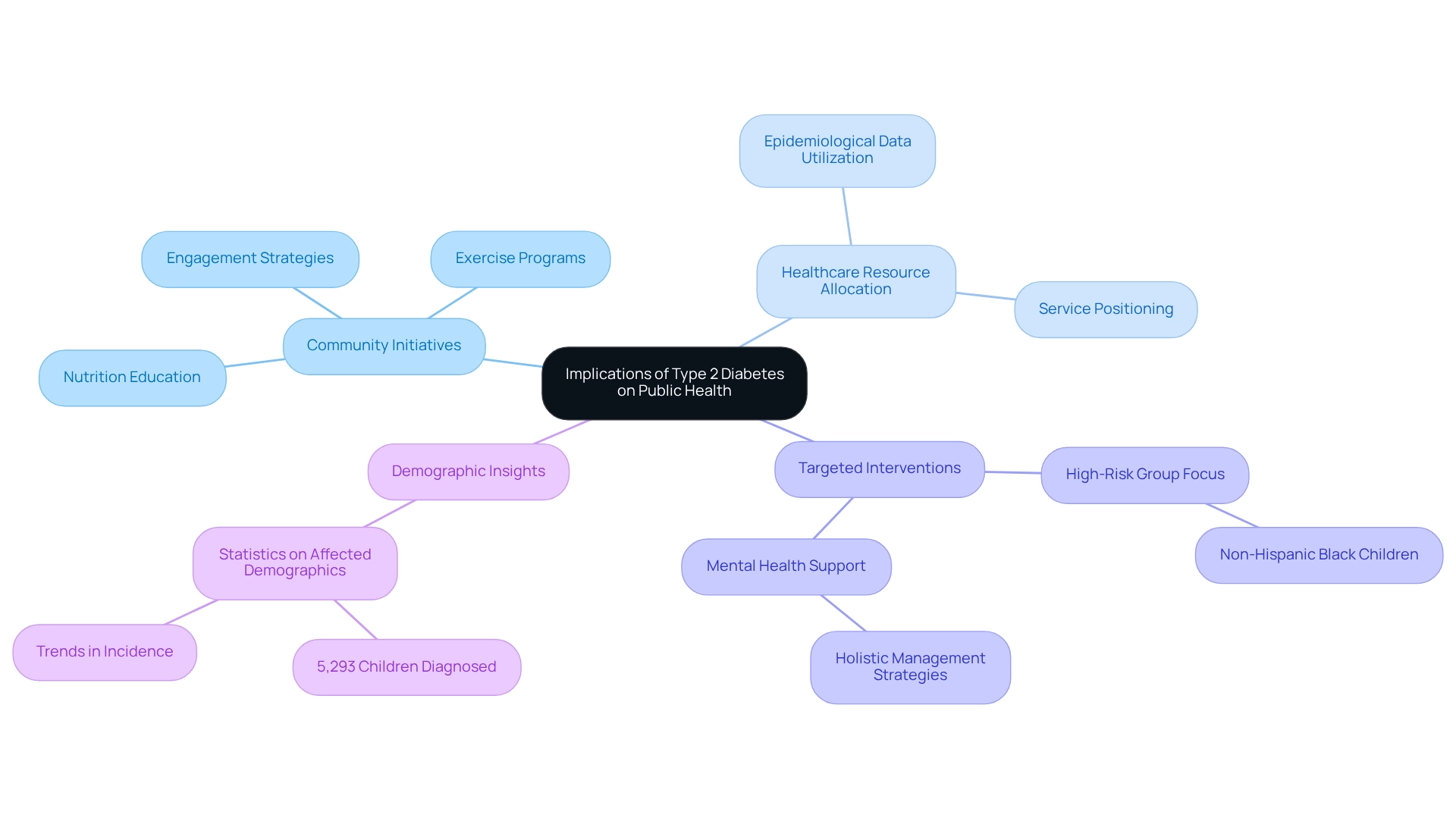Overview
This article seeks to illuminate the epidemiology of type 2 diabetes, focusing on the distribution, determinants, and implications of this condition within our communities. It's essential to recognize the demographic trends and risk factors that contribute to this growing concern. By understanding these elements, we can advocate for targeted public health interventions that not only manage but also reduce the prevalence of type 2 diabetes. Together, we can work toward improving health outcomes for everyone in our community.
It's understandable to feel overwhelmed by the statistics and information surrounding type 2 diabetes. However, you are not alone in this journey. By acknowledging the challenges and seeking support, we can foster a healthier future together. We encourage you to explore resources and connect with others who share similar experiences. Your health matters, and with the right support, we can make a difference.
Introduction
The rising tide of type 2 diabetes presents a significant challenge to public health around the world, highlighting the need for a deeper understanding of its epidemiology. By examining the distribution and determinants of this chronic condition, health officials can identify at-risk populations and develop targeted interventions to combat its spread. It's understandable to feel overwhelmed by the complexities of diabetes, but know that insights gleaned from epidemiological studies are invaluable in this fight.
As we reflect on the historical evolution of diabetes awareness and the critical demographic trends shaping its prevalence today, we must acknowledge the urgency for comprehensive strategies, especially for vulnerable communities. With obesity rates soaring and lifestyles shifting, the implications for public health are profound. This article delves into the multifaceted landscape of type 2 diabetes epidemiology, exploring how education and community support play vital roles in managing this growing epidemic. You're not alone in this journey; we are here to support you every step of the way.
Defining Type 2 Diabetes Epidemiology
Understanding type 2 diabetes epidemiology involves more than just numbers; it’s the study of how this condition impacts individuals within our communities. It looks at the distribution, determinants, and potential control of type 2 diabetes, encompassing the analysis of new cases, existing cases, risk factors, and the socio-economic and environmental influences on the disease. Comprehending the type 2 diabetes epidemiology is crucial for developing effective strategies and interventions that can help alleviate its impact on individuals and healthcare systems around the world.
At T2DSolutions, we deeply understand that these insights are vital for informing our resources and community support initiatives. By recognizing the trends and risk factors associated with type 2 diabetes, we aim to empower you with the knowledge and tools necessary for effective management and prevention. You're not alone in this journey; our commitment to education and community engagement is designed to address the challenges posed by this growing public health concern. Together, we can navigate this path and support each other every step of the way.

Historical Context and Evolution of Type 2 Diabetes Epidemiology
The historical context of type 2 diabetes epidemiology can be traced back to ancient civilizations, where the condition was recognized but not well understood. The term 'diabetes' derives from the Greek word for 'siphon,' which reflects the frequent urination characteristic of this disease. As we moved into the 20th century, significant advancements in medical research emerged, particularly as obesity and sedentary lifestyles became more common.
In the 1960s and 1970s, researchers began to uncover essential risk factors and the complex relationship between lifestyle choices and the occurrence of the disease. This era marked a pivotal shift in our understanding, leading to a greater emphasis on comprehensive education for both patients and healthcare providers. It's understandable to feel overwhelmed by this information, but recent studies highlight the importance of awareness and wellness promotion in achieving optimal blood sugar control. Enhanced educational resources are crucial for improving management outcomes.
Today, the type 2 diabetes epidemiology is recognized as a significant public health issue, with forecasts suggesting a persistent increase in cases driven by rising obesity levels and aging demographics. The necessity for immediate actions, such as increased research funding for effective prevention strategies, is more critical than ever as the burden of this condition is anticipated to grow.
At T2DSolutions, we aim to leverage this historical understanding to provide comprehensive resources and community support. Remember, you're not alone in this journey. We are here to support you every step of the way, empowering newly diagnosed patients to manage their condition effectively.

Key Characteristics of Type 2 Diabetes Epidemiology
Understanding type 2 glucose intolerance is essential, especially as it affects many individuals in our communities. Key characteristics of type 2 diabetes epidemiology include demographic trends—such as age, gender, and ethnicity—that significantly influence the prevalence of this condition. It's important to recognize that studies on type 2 diabetes epidemiology show blood sugar issues are more common in older adults, but there’s also a concerning rise in younger populations, driven largely by increasing obesity rates. Geographic variations further highlight this issue, as certain regions experience higher prevalence rates. These differences are often linked to lifestyle factors and access to healthcare, which can be challenging for many. Risk factors like obesity, lack of exercise, and genetic tendencies play a vital role in the type 2 diabetes epidemiology. Addressing these aspects is crucial, and community strategies should focus on providing support and resources to those affected.
If you or someone you know is navigating this journey, remember: You're not alone in this. We are here to support you every step of the way. Seeking help and understanding your risks can be empowering steps toward better health.

Implications of Type 2 Diabetes Epidemiology on Public Health
The consequences of type 2 diabetes epidemiology on community welfare are both significant and intricate. By understanding the distribution and determinants of this disease, public health officials can design targeted interventions for those at higher risk. Community-focused initiatives that promote nutritious eating and physical activity have demonstrated success in reducing sugar-related illnesses. For instance, efforts that engage local communities in nutrition education and exercise can lead to meaningful decreases in diabetes-related conditions, particularly among at-risk populations.
Epidemiological data are vital in guiding healthcare resource allocation, ensuring that services are positioned where they are most needed. With 5,293 children and adolescents aged 10 to 19 identified with this form of diabetes, the need for effective public health measures is clear. Furthermore, the rising prevalence of this condition necessitates a proactive approach to address its epidemiological factors, which is crucial for mitigating its impact on individuals and healthcare systems worldwide.
T2DSolutions is dedicated to addressing these challenges by providing a comprehensive resource center for education and community support related to diabetes. Expert insights highlight the importance of targeted interventions for high-risk groups, especially given the concerning statistics showing that non-Hispanic Black children faced the highest rates of this condition from 2002 to 2018. By focusing on these demographics, T2DSolutions can tailor wellness initiatives to meet specific needs, ultimately leading to better health outcomes. As Peter M. House wisely noted, "Diabetes is not a burden, but a lesson in perseverance and self-care," reminding us of the importance of resilience in managing this chronic condition.
In summary, addressing the factors related to type 2 diabetes epidemiology through community programs and targeted public health interventions is vital for reducing its incidence and enhancing overall health outcomes. T2DSolutions is committed to leading these efforts, offering the necessary resources and support to empower individuals and communities. Remember, you're not alone in this journey; we are here to support you every step of the way.

Conclusion
The exploration of type 2 diabetes epidemiology reveals critical insights essential for addressing this escalating public health crisis. Understanding the distribution, determinants, and risk factors associated with type 2 diabetes is vital for developing effective interventions aimed at high-risk populations.
It's concerning to see historical trends indicating a worrying rise in prevalence, particularly among younger demographics. This underscores the urgency for comprehensive educational initiatives and community support.
The implications of these findings are profound. By leveraging epidemiological data, health officials can implement targeted community programs that promote healthy lifestyles and improve access to care. The evidence suggests that such initiatives can lead to significant reductions in diabetes incidence, particularly in vulnerable populations. With alarming statistics highlighting the increasing rates of type 2 diabetes among children and adolescents, the need for proactive public health strategies has never been more pressing.
Ultimately, the fight against type 2 diabetes requires a collective effort that combines education, community engagement, and tailored interventions. By focusing on the epidemiological factors at play, organizations like T2DSolutions are poised to make a meaningful impact in empowering individuals and communities.
As we continue this journey to manage and prevent type 2 diabetes, it is imperative to remain committed to resilience and self-care. Remember, every step taken towards understanding and addressing this condition contributes to a healthier future for all. You're not alone in this journey; we are here to support you every step of the way.
Frequently Asked Questions
What is the focus of type 2 diabetes epidemiology?
Type 2 diabetes epidemiology focuses on the study of how this condition impacts individuals within communities, including the distribution, determinants, and potential control of the disease.
What aspects are analyzed in type 2 diabetes epidemiology?
It encompasses the analysis of new cases, existing cases, risk factors, and the socio-economic and environmental influences on type 2 diabetes.
Why is understanding type 2 diabetes epidemiology important?
Understanding type 2 diabetes epidemiology is crucial for developing effective strategies and interventions that can help alleviate its impact on individuals and healthcare systems globally.
How does T2DSolutions contribute to understanding type 2 diabetes?
T2DSolutions provides insights that inform resources and community support initiatives, aiming to empower individuals with knowledge and tools for effective management and prevention of type 2 diabetes.
What is the commitment of T2DSolutions regarding type 2 diabetes?
T2DSolutions is committed to education and community engagement to address the challenges posed by type 2 diabetes as a growing public health concern.



